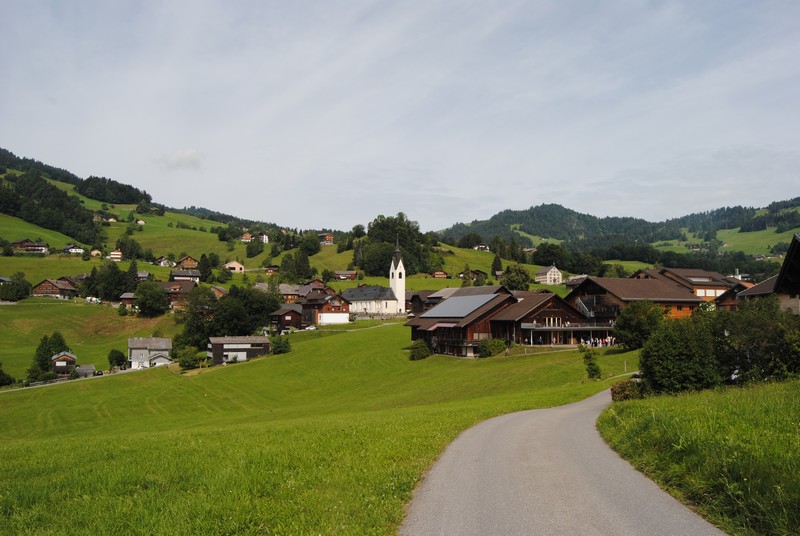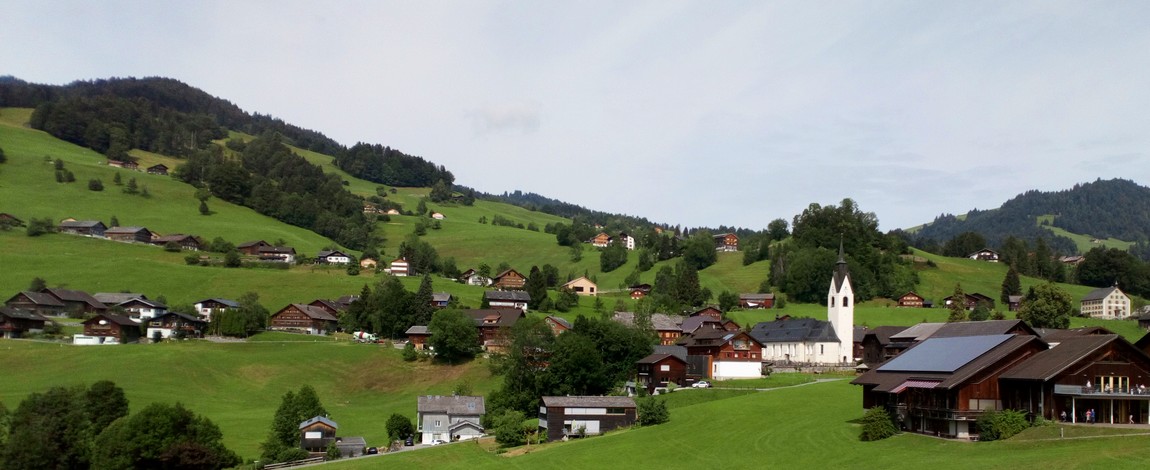
A few minutes before the concert starts, on the lawn in front of the auditorium, two young horn players perform the fanfare that lets people know it's time to go inside. When we look at the musicians, we see them in a natural setting that our Mediterranean eyes never get tired of: next to a gravel path, green grass, a green conifer copse a little further away, and green mountains in the background. If we had gotten away, we would see the beautiful wooden auditorium with a balcony full of people as we rush to get there. Just behind, the small parish with white walls and slate roofs, with its well-kept cemetery full of flowers. And in the distance, the gentle slopes and the wooden houses that are scattered throughout the green meadows. I'm talking about the Angelika Kaufmann-Saal, Schwarzenberg, and the Schubertiade, one of the most beautiful places for Lied lovers to gather.
And it turns out that this year is the 50th Schubertiade, and I wish I had gone again. But we can still go there for the next editions, though...
The inaugural concert of the festival was held on 8 May 1976 in the Palast of Hohenems, a town in the state of Voralberg – the Austrian part close to Lake Constance, Bavaria, Tyrol, Switzerland, and Liechtenstein. The artists at that first recital were Hermann Prey, a Schubert enthusiast, and Leonard Hokanson. The baritone, his secretary and frequent producer on his recordings, Christian Lange, and Gerd Nachbauer, a young man in his early twenties, were all actively engaged in the project.
Although the initial project was ultimately unfeasible, it is commendable. Following two seasons with the most renowned works by Schubert, the composer's works would be performed in chronological order for the subsequent ten seasons. The intention was to put Schubert in the right context and expand his body of work beyond those select few well-known pieces. The plan was unsuccessful for a variety of reasons; Prey and Lange abandoned the project, while Nachbauer persisted. He continues to be the director to this day.
However, the aim of spreading Schubert's work was fulfilled. Until 1984, only his works were programmed at the Schubertiade; that year other composers were introduced, those who had been his reference, starting with Beethoven. Over time, the repertoire continued to grow and, although Schubert remains the predominant composer, of course, today a wide variety of Lied and Chamber Music is heard, always with the greatest players. You can access every concert that has taken place since 1976 by clicking on this link, and every artist by clicking on this one. There's a lot to discover.
The Schubertiade was held in Hohenems' Palast until 1991, when it had to be moved to Feldkirch, which was about 25 km away, due to the facilities' poor state. A few years later, in 1994, landparteien began to take place, concerts in other nearby towns in which works that Schubert had composed or premiered during his travels were performed. Schwarzenberg, one of these villages, became the sole stable scene of the Schubertiade in 2001, and Hohenems joined again in 2005 with a new hall, the Markus-Sitticus-Saal. The Schubertiade, which is actually a few schubertiades distributed along spring and autumn, is distributed between these two places, with a splendid programme; look at this year's programme.
I began by talking about the fanfare, which is also by Schubert, of course. They are four Lieder, ranging from D. 202 to D. 205, composed in May 1815 for two voices or two horns. We're listening to the first song, Mailied, upon a poem by Ludwig Hölty. Not by two singers, though, because I couldn't find any recordings; those songs are usually performed by a choir, and we will listen to the Arnold Schoenberg Choir directed by Erwin Ortuer. I wish the song takes you to the Schubertiade and that we will meet there one day.
Der Schnee zerrinnt,
Der Mai beginnt,
Die Blüten keimen
Auf Gartenbäumen,
Und Vogelschall
Tönt überall.
Pflückt einen Kranz,
Und haltet Tanz
Auf grünen Auen,
Ihr schönen Frauen,
Wo junge Main
Uns Kühlung streun.
Wer weiß, wie bald
Die Klocke schallt,
Da wir des Maien
Uns nicht mehr freuen:
Wer weiß, wie bald
Die Klocke schallt!
Drum werdet froh!
Gott will es so,
Der uns dies Leben
Zur Lust gegeben!
Genießt der Zeit,
Die Gott verleiht!
The snow is melting
May is beginning
The blossoms are sprouting
On the trees in the garden
And the sound of birds
Resounds everywhere.
Pick a garland
And dance
On green meadows,
You beautiful women,
Where young May
Bring us coolness.
Who knows how soon
The bell will ring
and the May
we won't enjoy nomore
Who knows how soon
The bell will ring!
So be happy!
God wants that,
He who gave us this life
for enjoyement!
Enjoy the time
That God lends!















Comments powered by CComment